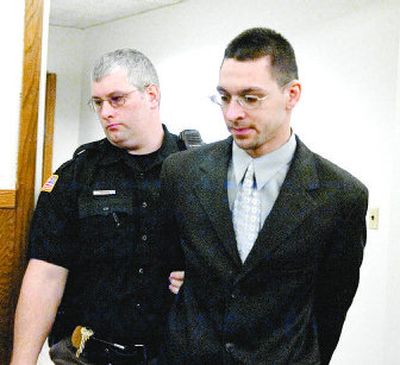New charges erase man’s second chance

Second chances like the one Jayson Bush received 2 ½ years ago are very rare. Bush may have squandered his.
Jury selection began Tuesday in the trial of the 27-year-old Spokane man accused of assaulting a child with a belt buckle. Regardless of the outcome, conviction or acquittal, it appears Bush is returning to prison.
On May 30, Gov. Chris Gregoire revoked the second chance that was granted Bush two years earlier by her predecessor, Gov. Gary Locke, who commuted a 24-year sentence imposed on Bush when he was just 17 years old.
Commutation of a sentence is rare, according to Richard Mitchell, Gregoire’s general counsel. He believes that Locke invoked the executive power only once during his eight years in office.
Locke commuted Bush’s sentence to time served, less than eight years, on the unanimous recommendation of the Washington state Board of Clemency and Pardons.
The case for commutation was made by students at Gonzaga University’s Center for Law and Justice, as well as the NAACP, on behalf of Bush, who is of African American and Anglo American ancestry.
Carl Mack, then-president of the Seattle-King County NAACP, called Bush’s commutation “the greatest civil rights victory I have ever won in my life.”
Bush’s parents, Ray and M’Liss Bush, of Spokane, also pleaded for leniency for their son, who they said had been the victim of discrimination and racial harassment by white youths at North Central High School in Spokane.
Bush continued to be harassed, they said, after transferring to Rogers High School; he was arrested in September 1996 and accused of firing a pistol at a group of young men in what police described as a drive-by shooting.
Bush maintained that he had fired in a panic and only to scare off the group, but an 18-year-old was struck in the upper thigh by a bullet that had apparently ricocheted off a solid object.
Fearing being tried in Spokane with “a white judge, a white prosecutor and white jury,” Bush said, he accepted his public defender’s advice to plead guilty. On Sept. 26, 1997, he was sentenced to 93 months on each of three counts of first-degree assault to be served consecutively.
Now, 10 years later, it appears Bush will have to return to prison to finish serving the approximately 16 years he has left on the sentence.
That is because Locke’s pardon was conditional on Bush staying out of trouble for two years.
“In the event Mr. Bush commits any offense classified as a felony or gross misdemeanor in the state of Washington, this conditional commutation is revoked and sentence imposed by the court reinstated without benefit of sentence reduction credit,” read Locke’s decree.
In April, 23 months after Bush was released from prison, he was arrested and charged with third-degree assault of the 13-year-old son of Bush’s girlfriend. Police accused Bush of striking the boy repeatedly with the buckle of a belt because of “lying and missing school assignments,” according to court documents.
Last week, Bush, who is being held in the Spokane County Jail, and the boy’s mother applied for a marriage license. Requests to interview Bush in jail went unanswered on Tuesday.
Bush’s attorney, Marla Polin, has appealed Gregoire’s decision, which she said she learned was definitive at a Jan. 8 hearing before Spokane County Superior Judge Jerome Leveque.
This presented significant difficulty for Bush’s defense, Polin said. Would his commutation still be revoked if he pleaded to a lesser charge? Or was successfully defending the felony charge his only hope of avoiding prison?
“That has not been answered,” Polin said.
Polin also complained that by revoking Bush’s commutation before his trial, Gregoire was denying him the constitutional guarantee of a presumption of innocence.
“By concluding that Mr. Bush has ‘committed’ this offense, you are summarily denying him due process without constitutional protections of opportunity and notice to be heard,” Polin wrote the governor.
Mitchell, however, said there is no avenue for appeal.
“The governor’s exercise of her gubernatorial authority to revoke the conditional pardon was entirely within the law,” Mitchell said on Tuesday.
The power of pardon is “not a judicial concept,” Mitchell said, it is granted exclusively by the state Constitution to the governor.
Bush’s trial continues this week in Leveque’s courtroom.